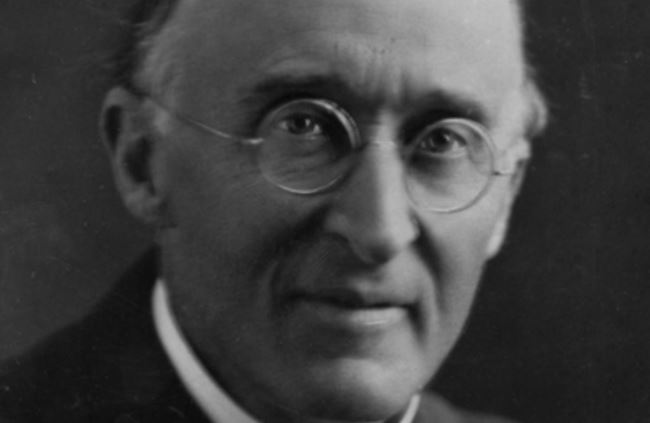Frederick Delius, A Mass of Life
by Byron Adams
Born January 29, 1862, in Bradford, England
Died June 10, 1934, in Grez-sur-Loing, France
Composed in 1904–05
Part II premiered on June 4, 1908, in Munich by the Hofkapelle München and the Munich Choral Society conducted by Ludwig Hess
Complete work premiered on June 7, 1909, in London at the Queen’s Hall by Beecham Orchestra and the North Staffordshire District Choral Society conducted by Thomas Beecham
Performance time: Approximately 1 hour and 41 minutes
Instruments for this performance: 3 flutes, 1 piccolo, 3 oboes, 2 English horns, 1 bass oboe, 3 clarinets, 1 bass clarinet, 3 bassoons, 1 contrabassoon, 7 French horns, 4 trumpets, 3 trombones, 1 tuba, timpani, percussion (snare drum, castanets, tam-tam, Thai gong, cymbals, glockenspiel, chimes, bass drum, triangle), 2 harps, 26 violins, 10 violas, 10 cellos, 8 double basses, chorus, and 4 vocal soloists
Frederick Delius is thought of as a British composer only out of convenience: his restlessly cosmopolitan nature resists easy pigeonholes. That he was born in England is without doubt: baptized Fritz Delius, he was the son of a stern, unbending wool dealer in the Yorkshire town of Bradford. Delius’ father, Julius, encouraged amateur music-making in the home without entertaining even the remote possibility of a musical career for either of his sons. However, the materialism and suffocating strictness of the Delius home fomented rebellion in young Fritz’s heart: he rebelled decisively against his upbringing. This narrative is hardly unusual in the annals of music history, but young Delius’ compulsive wanderlust is astonishing. In 1884, the untamable young Fritz somehow convinced his father to set him up with a truly harebrained scheme—running a citrus plantation in northern Florida.
Delius, who changed his name to Frederick after his tyrannical father’s death, spent very little time cultivating fruit and a great deal of time hunting alligators, listening to the singing of the African-Americans, and studying music with the organist of a prominent Roman Catholic church in Jacksonville. During this wild period, Delius may well have contracted syphilis in the brothels for which Jacksonville was noted at the time.
Although Delius’ time in Florida was relatively short, it was on the banks of the Saint Johns River that he found his vocation as a composer. Late in life, a blind and paralyzed composer recalled to his amanuensis, Eric Fenby, the magical singing of the black farm workers: “They showed a truly wonderful sense of musicianship and harmonic resource in the instinctive way that they treated a melody.” At such moments, Delius experienced the ecstasy of pantheistic rapture. As he remembered long after, “Hearing their singing in such romantic surroundings, it was then and there that I first felt the urge to express myself in music.” As his biographer Philip Heseltine—later known as a composer who published under the pseudonym “Peter Warlock”—wrote, “Delius is, indeed, a pantheistic mystic whose vision has been attained by an all-embracing acceptation, a ‘yea-saying’ to life . . . the realization that change and death are only apparent.”
From America, Delius travelled to Leipzig, where he studied hard at the famous conservatory there; later characterizations of Delius as a poetical composer with an underdeveloped technique who could only write orchestral miniatures were nonsense. The encouragement of Norwegian composer Edvard Grieg further spurred Delius’ ambitions: he composed incessantly, producing several unproduced operas including The Magic Fountain (1895), which is set in Florida. As fascinated by Scandinavia as he was by Florida, Delius exulted in the rugged northern landscape, hiking long distances over harsh but magnificent terrain. During his travels, Delius also mastered several languages, including Danish and Norwegian.
It was on a visit to Norway that Delius discovered the work of literature that had the greatest impact on his music and personality: Friederich Nietzsche’s Also sprach Zarathustra (1883–85). Eric Fenby tells the story of that momentous encounter: “When, one wet day . . . he was looking for something to read in the library of a Norwegian friend with whom he was staying during a walking tour, and had taken down a book, Thus Spake Zarathustra . . . he was ripe for it. It was the very book he had been seeking all along.” Nietzsche’s volume chimed with Delius’ deepest experience of life, for, as Fenby notes, “Delius was always a pagan.”
The culmination of Delius’ obsession with Also sprach Zarathustra came in 1905, when he completed his choral fresco, A Mass of Life. Using a text compiled by the conductor Fritz Cassirer, Delius set Nietzsche’s words directly in German. (The score of Delius’ work was published with the English title, A Mass of Life, across from the German one, Eine Messe des Lebens.) In his skillful redaction, Cassirer included all of the most celebrated passages, including the Mitternachtslied Zarathustras (“O Mensch! Gib Acht”) that Mahler set in his Third Symphony (1896). Cast in eleven sections, A Mass of Life ends with an exuberant chorus: no “dying fall” here, but an exultant celebration intermingled with the contemplation of eternity.
Byron Adams is a Professor of Musicology at the University of California, Riverside.

